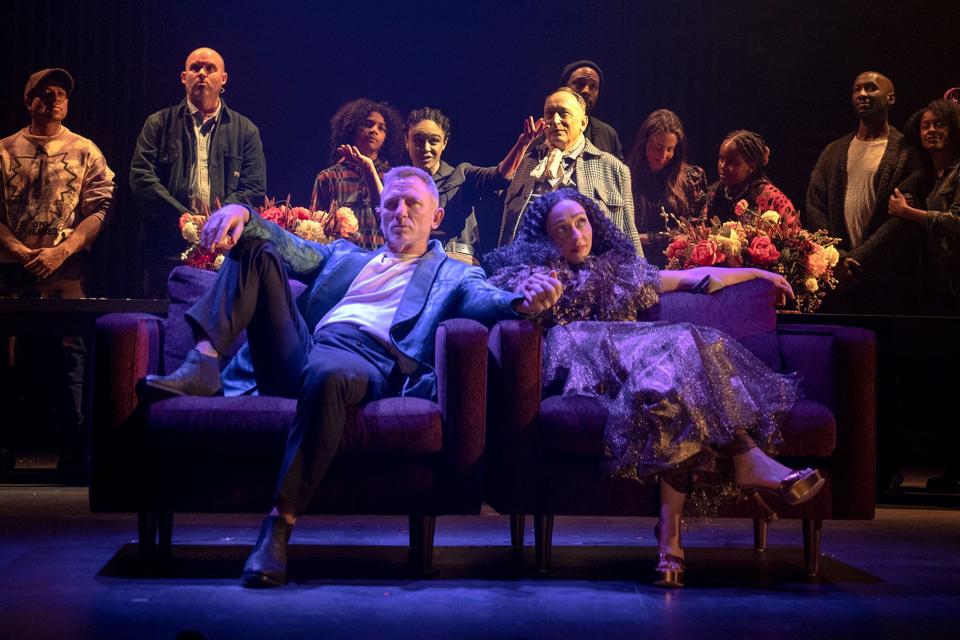Macbeth review: Daniel Craig and Ruth Negga bring movie-star glamour to a starkly modern Broadway staging
- Oops!Something went wrong.Please try again later.
- Oops!Something went wrong.Please try again later.
- Oops!Something went wrong.Please try again later.
Is there any limit to the forms that Hollywood's love affair with the Scottish play can take? Less than six months after Joel Coen's lush, Denzel-ified screen adaptation, Macbeth makes a play for Broadway with Bond himself, Daniel Craig, in the title role, and Oscar nominee Ruth Negga (Loving) as his fatally duplicitous Lady.
It's also a Sam Gold production — the same man who had Craig and David Oyelowo dancing in Adidas track pants to "Hotline Bling" in his 2016 Othello, and Oscar Isaac declaiming in his underpants for Hamlet the following year. Which means that this Macbeth promises something both starry and strenuously modern, a pledge it duly delivers on the starkly unadorned stage of New York's Longacre Theatre in a limited run through July 10. Gold's current reworking also manages to make considerably more hay of the famously tight play, adding nearly an hour of runtime and several extended parentheticals that land well outside Shakespeare's sacred text.
That rewrite begins with actor Michael Patrick Thornton, who uses a wheelchair, rolling out to the lip of the stage for a leisurely disquisition on demonology and the history of plagues — an introduction so chatty and informal, with the house lights still turned up, that it hardly registers as the night's official start. And yet there they are moments later, three witches gathered hurly-burly at their cauldron (which here is more like a portable camp table, laden with various cooking-demo bowls and utensils). Characters stride onto the nearly bare boards in modern dress that leans toward urban-utilitarian chic; they could be Club Monaco models, or employees at a boutique marketing firm.

Joan Marcus Daniel Craig and Ruth Negga in 'MacBeth'
But they still speak the language of the Bard in long, flowing paragraphs: the king (a garrulous, round-bellied Paul Lazar), his purple-haired heir (Billions' Asia Kate Dillon), assorted minions, and of course the would-be usurper to the throne, Craig. Race, gender, and accents are fluid; Banquo, Macbeth's loyal friend and fellow soldier, is portrayed with feline grace by Amber Gray (Hadestown) in box braids and cargo pants, and the coven (Maria Dizzia, Phillip James Brannon, and Bobbi Mackenzie) is now co-ed.
And Macbeth is of course a movie star, one who struts and frets his two-plus hours upon the stage looking so virile and well-tailored that the lord's legendary crisis of faith feels like a rather hard sell, despite Craig's sincere and impassioned investment in the role. He's just too robust, maybe, to fully convince of us his growing madness — a man we've watched execute so many casually efficient kills and divert various world-ending crises on screen that one small murder plot hardly seems like it should dismantle his mental health so completely.
He does share a thrumming chemistry with Negga, though, whose Lady Macbeth is easily his master and the play's indelible focal point. The Irish actress is so small-boned that it looks like a stiff wind could take her, but her furious life force fills the room. (There are shades, unmissably, of her mesmerizing Hamlet from the 2020 production at Brooklyn's St. Anne's Warehouse.) Where Frances McDormand was still-waters cool, almost forbidding in her screen turn last year, Negga's Lady is fluid, anxious, frankly sexual. She's very much in a tempest of her own making, though her costars often lean breezily comedic; another fourth-wall break mid-show, with Lazar's King, plays like casual standup, complete with beer cans.
Gold's choice to incorporate these various interruptions adds novelty, though they also steal something from the momentum. The actors frequently carry portable smoke machines and spotlights to create their own atmosphere as they go and freely bend the elasticity of Shakespeare's language to their will, bringing the audience in on the joke via tweaked physicality and implied winks to the balcony. This is not a grand Macbeth — the staging is too sparse and self-aware, almost tossed-off (or at least determined to give that impression), for that. But in a tender, tremulously sung coda, the toil and trouble fade, subsumed by willful intimacy: its marquee stars and supporting players alike brought low by tragedy, tangled in a scrum on the floor. Grade: B
Related content:

